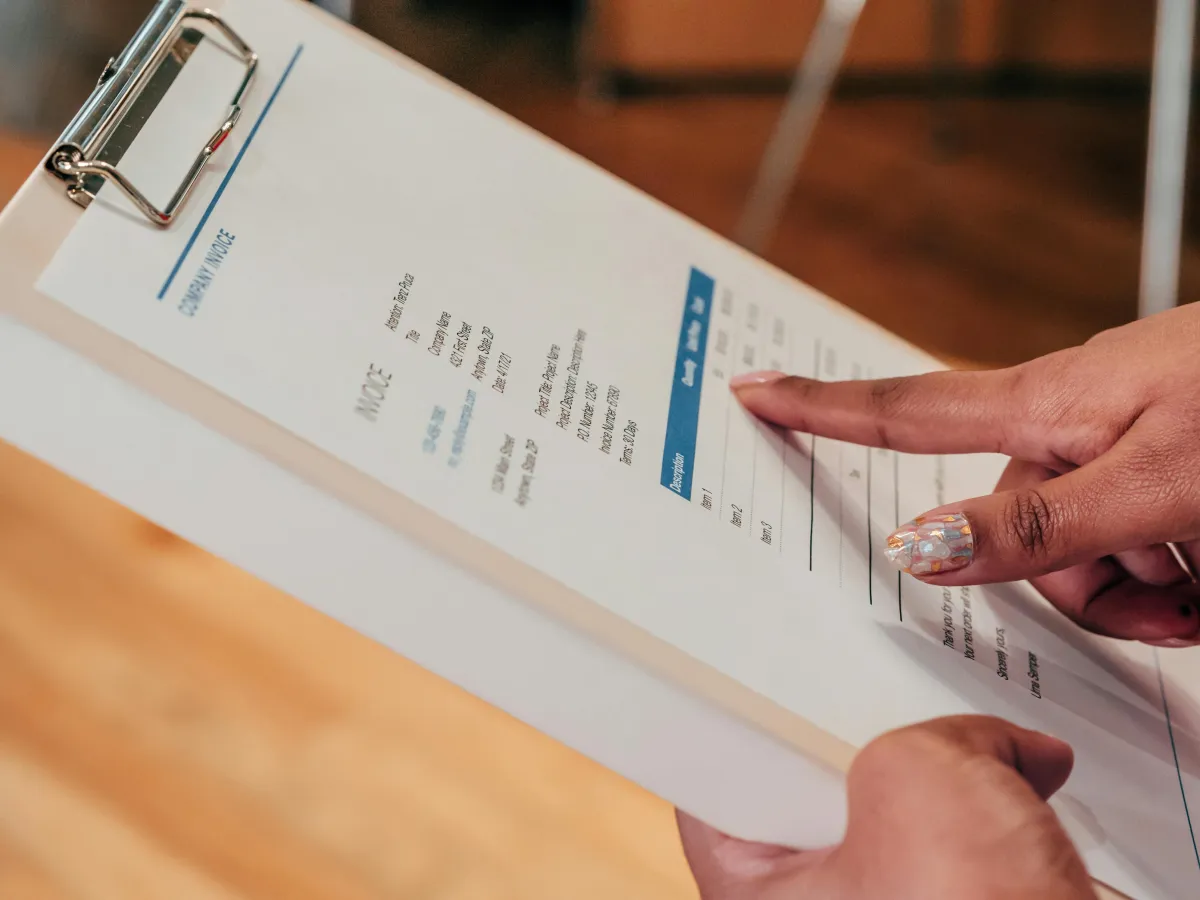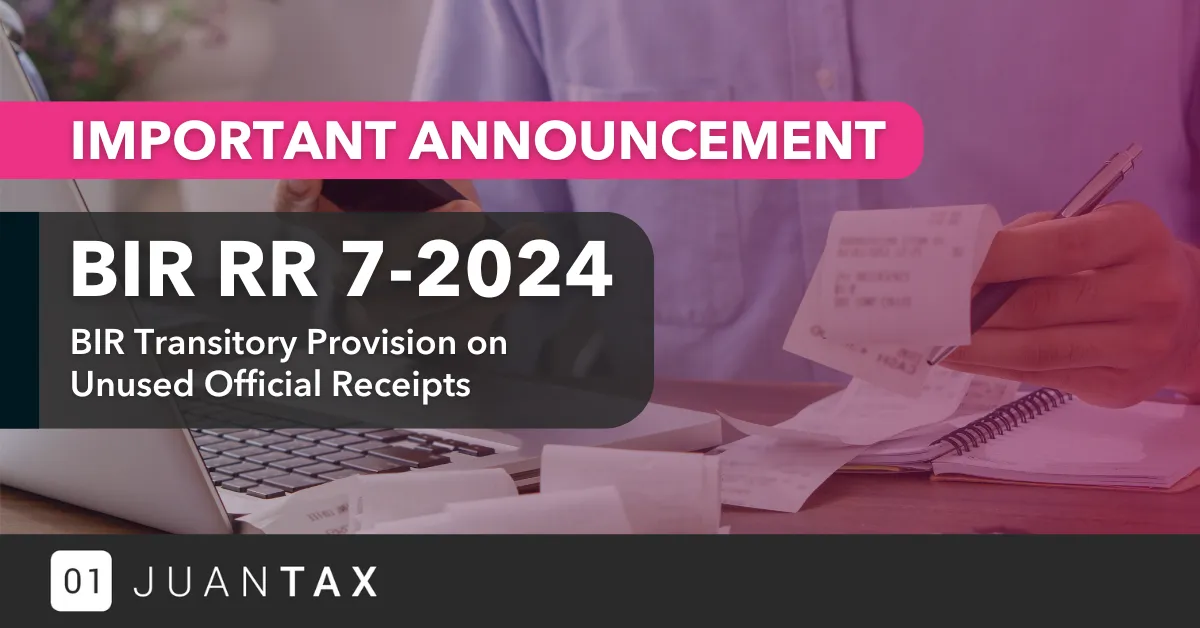Navigating the Transition to Invoices
(What Taxpayers Need to Know)

Over the years, businesses have undergone significant changes in their invoicing processes, and adapting to these transitions is crucial for success. It's vital for businesses to comply with legal requirements when it comes to issuing invoices to avoid penalties and legal issues. Understanding the nuances of invoicing is critical in maintaining financial health and fostering strong relationships with clients. Let's research into the world of invoicing and uncover what businesses need to know to navigate this transition smoothly.
Overview
The Ease of Paying Taxes Act (EOPT) no longer requires the issuance of Official Receipts, it operates to establish the INVOICE. According to the RR No. 7-2024, INVOICE is defined as principal invoice evidencing the sale of goods and/or services issued to customers in the ordinary course of trade or business. Invoice is classified as VAT Invoice and Non-VAT Invoice. Here is the information that should be contained in a VAT Invoice: TIN, Name and Address of the VAT-purchases is REQUIRED in case of sales amounting to more than P1,000.00. Filling out the business style is no longer required and other information required is written under Section 6(B) of RR No. 7-2024.
Any business operating in the Philippines are required to issue invoices. The following are the main rules specified in BIR's Revenue Regulations (RR) No.7 2024:
The new threshold for mandatory issuance of invoices is P500 and up. This threshold is adjusted every three years based on inflation.
Issuing of one invoice at the end of the day for aggregate sales for the day for sales transactions below P500
The word INVOICE must be clearly printed on the documents. Official Receipts are no longer mandatory but can be issued optionally as a supplementary document.
PRIMARY INVOICES maybe named as the following:
Sales Invoice
Commercial Invoice
Billing Invoice
Cash Invoice
Charge Invoice
Credit Invoice
Miscellaneous Invoice
Service Invoice
Etc.
Meanwhile, here are the example of SUPPLEMENTARY/SECONDARY DOCUMENTS
Official Receipts
Delivery Receipts
Collection Receipts
Purchase Order
Sales Order
Debit/Credit Memo
Billing of Lading
Statement of Account
Etc.
Note: For purposes of VAT, Supplementary Documents are not valid proof to support the claim of input taxes by the buyers/purchasers of goods and/or services. However, taxpayers may continue issuing Official Receipt or Collection Receipt but as a supplementary document only which will only serve as proof of payment.
Transitory Provisions (Section 8 – RR No. 7-2024)
Certificate of Registration (COR) reflecting the Registration Fee – Business taxpayers are not required to replace its existing BIR COR that includes Registration Fee. It means that the COR shall retain its validity, and taxpayers are no longer required to pay the Annual Registration Fee, effective January 22, 2024.
Unused Official Receipts
2.1 Taxpayer to continue the use of remaining Official Receipts as supplementary document
All unused or unissued Official Receipts may still be used as supplementary documents until fully consumed. Provided that these supplementary documents must have the phrase “THIS DOCUMENT IS NOT VALID FOR CLAIM OF INPUT TAX” in bold letters and be conspicuously printed.
3.1 Taxpayer to convert and use the remaining Official Receipts as Invoice
To promote the ease of doing business, the remaining unused Official Receipts can still be used at the option of the taxpayer until December 31, 2024.
Taxpayers shall be allowed to strikethrough the word “Official Receipt” [e.g. Official Receipt] on the face of the manual and loose leaf printed receipt and stamp “Invoice”, “Cash Invoice”, “Charge Invoice”, “Billing Invoice”, “Service Invoice”, or any name describing the transaction.
These documents shall be VALID FOR CLAIM OF INPUT TAX by the buyer/purchases for the period issued from JANUARY 22 to DECEMBER 31, 2024, provided that the invoice to be issued bears the stamped “INVOICE” and contains information required under Section 6(B) of these regulations.
The stamping of official receipts as invoices by taxpayers does not require approval from any Revenue District Offices but must comply with the Reportorial Requirement of unused official receipts to be used as invoice.
However, taxpayers should obtain newly printed invoices with an Authority to Print (ATP) before fully using or consuming the converted Official Receipts or before December 31, 2024, whichever comes first.
Requirements for Securing New Authority to Print (ATP)
Fill up the form 1906 (2 sets)
Latest Authority to Print – Original
Inventory of Unused Receipts (2 Sets)
Surrender all the Unused Receipts
Photocopy of Valid ID with 3 Specimen Signature
Special Power of Attorney (If Representative)
4.1 Reportorial Requirement of Unused Official Receipts to be Used as Invoice Upon Effectivity of these Regulations
These regulations are effective starting April 27, 2024.
All unused manual and loose-leaf Official Receipts to be converted as Invoice shall be reported by submitting an inventory of unused official receipts, indicating the number of booklets and corresponding serial numbers within thirty (30 days) upon effectivity of these regulations to your respective Revenue District Offices.
Requirements for Submission of Inventory List of Unused ORs to be Used as Invoice
Two (2) original copies of filled-out Inventory List of Unused ORs
One (1) Valid ID and Authorization Letter (If Representative) *
Invoice – Stamp *
Original copy of Authority to Print *
*These requirements depend on your respective RDO.
For Cash Register Machine (CRM)/Point-of-Sales (POS) Machines and E-receipting or Electronic Invoicing Software
Change name of Official Receipt to Invoice by system configuration, without the need to notify the RDO having jurisdiction over the place of business of such sales machines. Continue to use the series at the time of configuration.
However, taxpayers should submit notification to RDO where registered on the start of series converted (labelled) to invoice.
Notes:
For taxpayers using duly registered Computerized Accounting System (CAS) or Computerized Books of Accounts (CBA) with Accounting Records need to revisit their system to comply with the provisions of the EOPT Act, since the system reconfiguration will have a direct effect on the financial aspect.
Issuance of “OFFICIAL RECEIPT” for the sale of goods or services after June 30, 2024, will not be considered as evidence of sales of goods or services.
Shall be tantamount to non-issuance of Invoice; and
Subject to penalty of P1,000 to P50,000 – and suffer to imprisonment of not less than 2 years but not more than 4 years [Sec 264(a) of Tax Code].
Following this informative guide, taxpayers can successfully navigate the transition to invoices by understanding key concepts and fostering strong communication with clients. By embracing this process, businesses can streamline their financial operations and enhance their overall efficiency and professionalism.
You're all set! To see all the information, be sure to read the official BIR RR No. 7-2024. If you need help with submitting inventory list and securing a new Authority to Print (ATP), feel free to send us a message.
Related Articles:
Upcloud Accounting
Virtual Outsourced Accounting and Bookkeeping Services in the Philippines
Upcloud Accounting offers online accounting and bookkeeping services specializing with startups and SMEs in the Philippines.
Our goal is to increase efficiency, automation, and transparency across the accounting and finance functions of our clients with our cutting-edge technology.
If you want to move your company’s finance function online, contact our Team of Expert Accountants and Bookkeepers directly via [email protected] or visit www.upcloudaccounting.com to learn more about how Upcloud Accounting accounting services can support your PH business!
Disclaimer: This article or blog is only for general knowledge and guidance and is not a substitute for an expert opinion. For technical advice, please consult your tax / legal advisor for your specific business concerns. For comments, suggestions, and feedback, feel free to email us at [email protected]
Click the button below to schedule a FREE online consultation with us.
© 2023 by Upcloud Accounting. Created by Genuinely Business Solutions.


